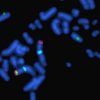Epigenetic signaling and its therapeutic blockade in leukemias and solid tumors
Extensive genome sequencing has produced a nearly complete compendium of genetic aberrations in leukemias and solid tumors. In spite of this, the molecular mechanisms of aberrant cell survival and salient features of disease such as therapy resistance remain elusive.
We have adapted recently developed high-resolution mass spectrometers for ultra-sensitive analyses of aberrant signaling and gene expression of cancer cells. Using both discovery and mechanism-based paradigms, we generate quantitative models of cellular signaling and its control of gene expression to explain fundamental behaviors of cancer cells, including aberrant cell survival, self-renewal, and resistance and adaptation to cancer therapies. We pursue this fundamental question: Do cancer cells use normal molecular mechanics out of place and time, or do they depend on inherently aberrant molecular structures?
In particular, we are investigating the mechanisms by which biochemical signaling controls pioneer transcription factors, such as MEF2C and MYB, to induce and sustain cancer development. We recently discovered that kinase-dependent dysregulation of transcription factor control is a determinant of therapy response in acute myeloid leukemias, and that peptidomimetic blockade of transcriptional coactivation can be used for its therapeutic targeting and discovery of fundamental mechanisms of cancer gene control.
To define molecular mechanisms that sustain leukemia stem cells, we leverage label-tracing techniques in human leukemias that preserve stem cell function in vivo. These approaches enable prospective isolation and functional genetic manipulation of immunophenotypically-varied leukemia stem cells in human patient specimens, as well as establish the key functions of epigenetic plasticity in leukemia development and therapy resistance.
This work aims to define specific molecular aberrations of signaling cascades and gene expression control complexes that lead to pathogenic cell fate specification and therapy resistance. Using protein engineering, biochemical and cell biological approaches, we generate molecular probes to perturb signaling and transcription factor complexes. Using genetically-engineered and primary human xenograft mouse models, we determine their anti-cancer activities in structure-function studies, and advance compelling candidates for translation to clinical trials for patients.



